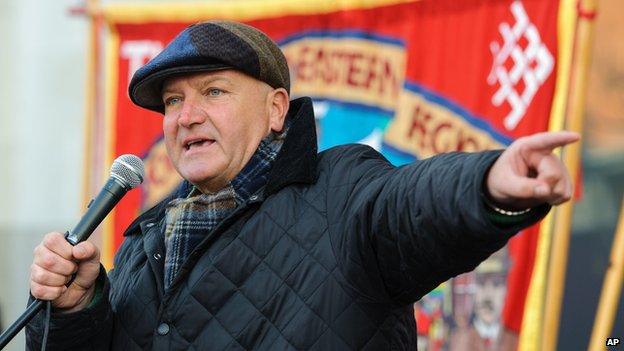Bob Crow: Public enemy number one or national treasure?
- Published

Defiant, belligerent, proud.
In life, Bob Crow embodied his team Millwall's famous song, "No-one likes us, we don't care".
In death, those who once condemned him and who he regarded as his enemies - Tory cabinet ministers, the Mayor of London and, yes, the leader of the Labour Party - have lined up to praise him (though in the case of Ed Miliband not on camera) as a fighter for those he regarded as his people.
Crow, in my experience, was simply unmoved by the views of the political and media establishment. This was something I discovered when I first met him many years ago at RMT HQ.
Bob turned up before our feature-length interview casually dressed. In fact he was wearing a T-shirt and the skimpiest pair of shorts I've ever seen on a man.
After we'd talked about the lovely weather and the focus of my interview I hinted that the time had come for him to get changed to appear on camera. This, he told me, is all I've got. Today, he explained, is the works outing and we're going to the seaside.
Having taken off my jacket and tie and instructed the cameraman to film from the waist up the interview began - on Bob's terms.
I had prepared by reading newspaper cuttings about a man whom Fleet Street invariably dubbed a "dinosaur" or "the most hated man in Britain".
One particular article stood out. Perhaps not surprisingly it was in the Daily Mail. The article claimed that Crow - who had a bust of Lenin in his office - was an unapologetic admirer of the Soviet Union.
I put it to Crow that he faced a hostile media and used the quote about the Soviet Union as an example. Oh no, he interrupted. He was an admirer of the Soviet Union - in particular its industrial policies.
After listening for a while to this paean of praise for a system which conventional opinion regarded as a costly and bloody failure, I added: "Notwithstanding the millions who were killed for their political beliefs?" After barely a beat, Bob responded: "Yeah, notwithstanding that."
It was attitudes like that which won Crow admirers and enemies. So too the fact he celebrated Margaret Thatcher's death, fought Labour leaders for their betrayal of the working class and was ready to threaten to disrupt the Olympics, a Royal Wedding and millions of people's daily lives.
However, friend and foe alike know that Bob Crow did all this thanks both to deeply held beliefs and a determination to fight for his members.
Few doubt that he was not just one of the best known but also one of the most effective trade union leaders in terms of doing the job he was paid to do: protecting the job security of his members, increasing their pay and improving their conditions.
Behind the public displays of aggression was a man, it is widely said, who was willing and capable of striking a deal in private.
No-one, of course, likes to speak ill of the dead but there are other reasons why Bob Crow may appear to have been transformed overnight from public enemy number one to a national treasure.
This was a man who knew what he thought, knew whose side he was on and knew who the enemy were - in an era when that can be said of a shrinking number of people in public life.